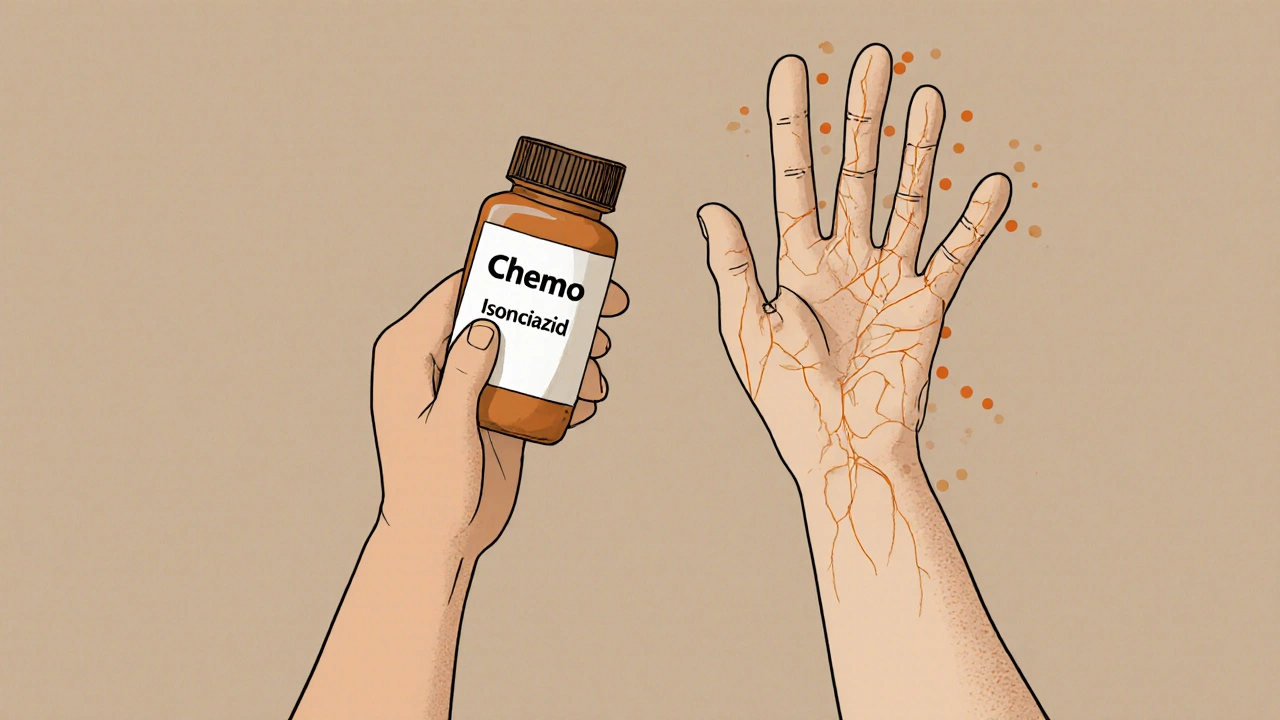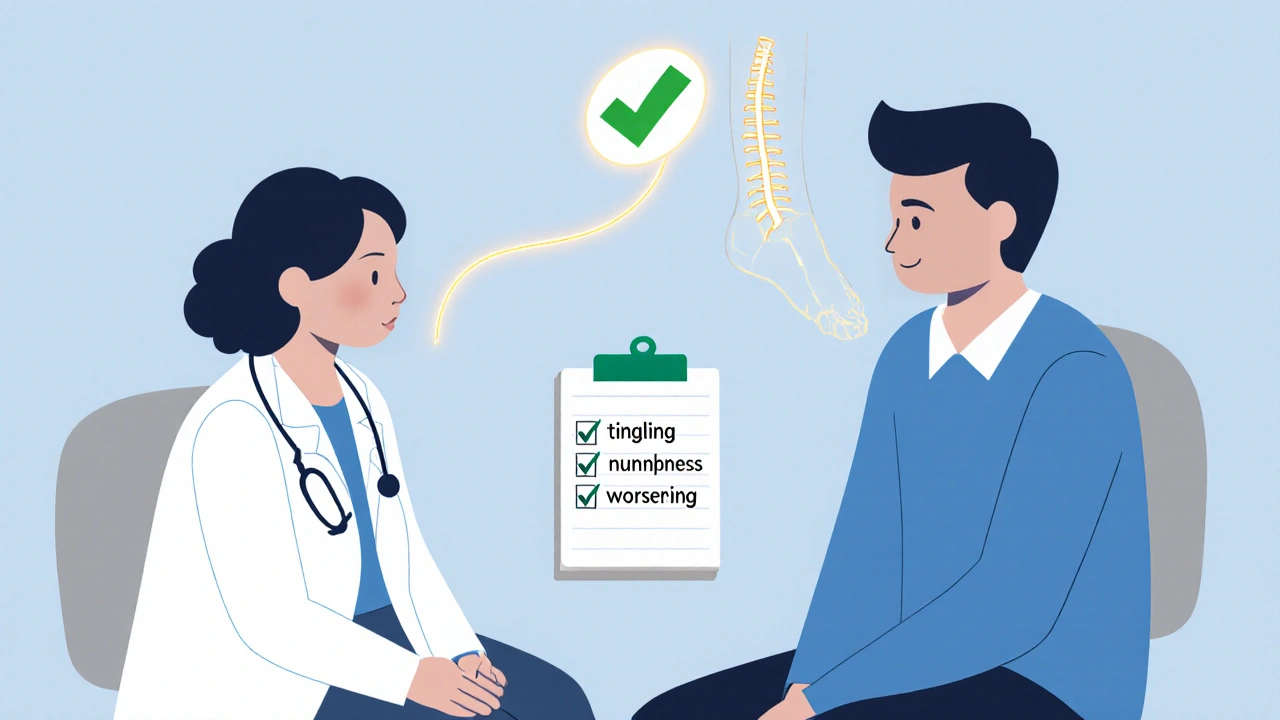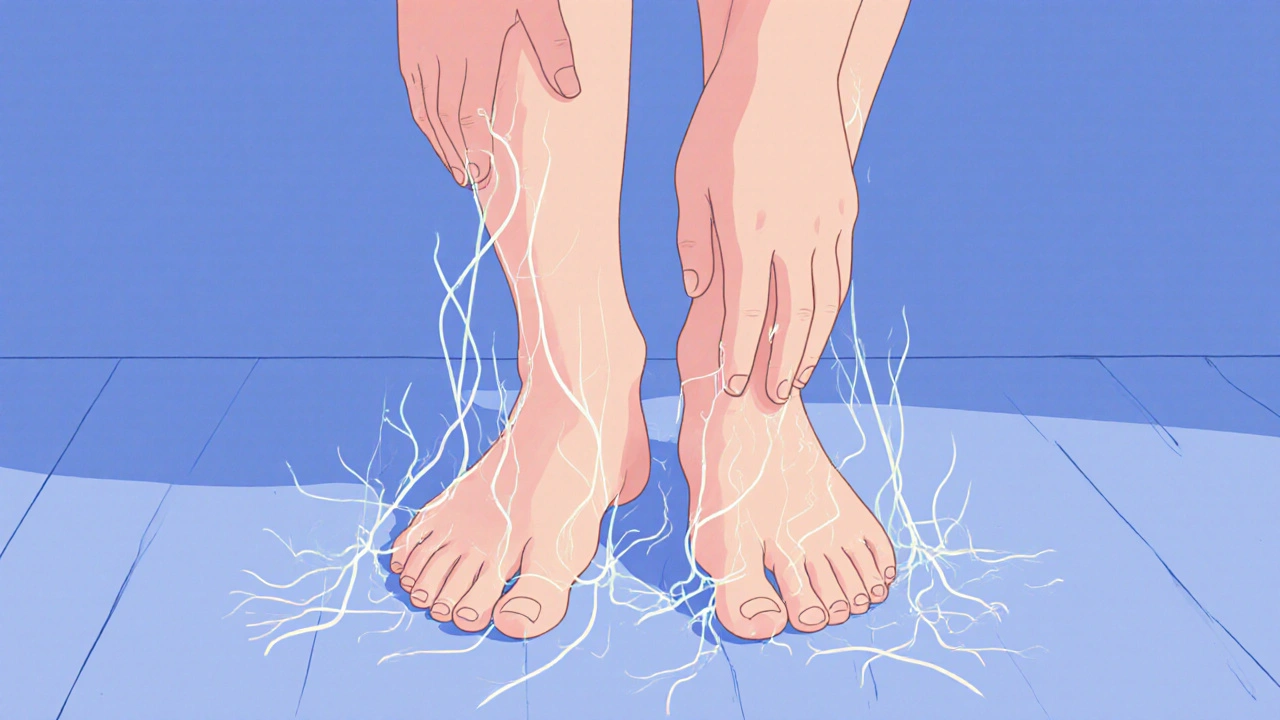Medication Neuropathy Risk Assessment Tool
Assess Your Medication Risk
Risk Assessment Result
Key Symptoms
Recommended Actions
When you start a new medication, you expect side effects like dizziness or an upset stomach. But what about that quiet, creeping tingling in your toes or fingers? It’s easy to brush off as “just stress” or “poor circulation.” But if you’re taking certain drugs, those sensations could be your nerves sending an early warning signal. Medication-induced neuropathy is more common than most people realize - and catching it early can mean the difference between a temporary annoyance and permanent nerve damage.
What Does Medication-Induced Neuropathy Feel Like?
You might notice a pins-and-needles feeling in your feet or hands - like when your foot falls asleep, but it doesn’t go away. Or maybe your fingers feel thick, clumsy, like you’re wearing invisible gloves. Numbness is another big one: you drop things because you can’t feel them properly, or you don’t notice a blister forming on your heel. These aren’t random glitches. They follow a pattern called the “glove and stocking” distribution - meaning symptoms start in the farthest points of your limbs and creep inward.
This isn’t just discomfort. It’s your peripheral nerves - the ones connecting your brain and spine to your hands and feet - being damaged by chemicals in the medication. The good news? In many cases, this damage is reversible if you act fast. The bad news? Most people wait until the numbness spreads to their ankles or up their arms before they say anything to their doctor.
Which Medications Are Most Likely to Cause This?
Not all drugs cause nerve problems - but some do, often in predictable ways. Chemotherapy is the biggest offender. About 60% of people getting chemo develop some level of nerve damage. Drugs like oxaliplatin cause tingling so intense, some patients can’t hold a cold drink. Paclitaxel leads to numbness that can last for months after treatment ends. Even common antibiotics like isoniazid (used for tuberculosis) can trigger it in up to 20% of users.
Other culprits include:
- Metronidazole (used for infections) - especially after taking it for more than a month
- Stavudine (an older HIV drug) - causes numbness in about 1 in 3 users
- Amiodarone (for heart rhythm problems) - can damage nerves over years of use
- Phenytoin (for seizures) - affects nerve insulation
Even statins - the cholesterol-lowering pills millions take daily - are sometimes blamed. But here’s the twist: experts still debate whether statins actually cause nerve damage, or if people just notice tingling and assume it’s the pill. The evidence? Weak. If you’re on statins and feel tingling, talk to your doctor - but don’t assume it’s the medication without checking other causes.
Why Early Detection Matters
Neurologists call tingling and numbness the “canary in the coal mine.” These are the first signs your nerves are under stress. Before you lose muscle control or can’t walk without stumbling, you get these subtle warnings. A 2022 study found that patients who reported tingling right away and had their medication adjusted were 73% more likely to fully recover within six months.
But here’s the problem: 52% of people with drug-induced neuropathy wait three months or longer before their symptoms are taken seriously. Why? Because doctors often assume the numbness is from diabetes, aging, or the disease itself - especially in cancer patients. One study showed doctors misattribute nerve damage to the underlying illness in nearly a third of cases.
That’s why you need to be your own advocate. If you start feeling unusual sensations after beginning a new drug, write it down. Note when it started, where it is, and whether it’s getting worse. Don’t wait for your next appointment. Call your provider. Early intervention can mean switching doses, adding supplements like vitamin B6 (which helps with isoniazid-induced neuropathy), or pausing the drug temporarily - without losing its benefits.

How Doctors Diagnose It
There’s no single blood test for medication-induced neuropathy. Diagnosis is based on your history, symptoms, and a few simple exams. Your doctor will likely:
- Test your reflexes - especially in your ankles
- Check your ability to feel light touch, vibration, and temperature
- Ask you to walk heel-to-toe or stand on one foot
For more detail, they might order a nerve conduction study. This test measures how fast electrical signals travel through your nerves. In early cases, the signal in your sural nerve (in the ankle) might be weaker than normal - even before you feel pain.
Some hospitals now use newer tools like SudoScan, a device that measures sweat response to detect small nerve damage. It’s not everywhere yet, but it’s becoming more common in cancer centers. It can spot nerve changes weeks before you even notice symptoms.
What You Can Do Right Now
If you’re experiencing tingling or numbness and you’re on a medication known to cause it, here’s what to do:
- Don’t panic - but don’t ignore it. This isn’t normal, and it’s not just “getting older.”
- Track your symptoms. Use a simple notebook: date, location, intensity (1-10), what makes it better or worse.
- Call your prescriber. Say: “I’ve noticed tingling in my feet since I started [medication]. I’m concerned it might be nerve-related.”
- Ask about alternatives. Is there a similar drug with less nerve toxicity? Can the dose be lowered?
- Protect yourself. If your feet are numb, check them daily for cuts or blisters. Wear shoes indoors. Install grab bars in the bathroom. Falls are a real risk when you can’t feel your feet.
Some people benefit from supplements like alpha-lipoic acid or acetyl-L-carnitine - but only under medical supervision. Don’t self-prescribe. One trial showed acetyl-L-carnitine reduced neuropathy severity by 40% in people on paclitaxel, but it’s not right for everyone.

What Happens If You Ignore It?
Left unchecked, mild tingling can turn into chronic pain, muscle weakness, or loss of balance. In severe cases, people lose the ability to walk without assistance. For cancer patients, nerve damage can force doctors to stop life-saving treatment. And once nerves are dead, they don’t grow back easily.
There’s also a hidden cost. In the U.S. alone, managing drug-induced neuropathy costs over $1.2 billion a year. That’s not just medical bills - it’s lost work, home modifications, caregiver time. Most of that could be avoided with early recognition.
What’s Changing in the Field
Doctors are starting to take this seriously. The American Society of Clinical Oncology now recommends routine nerve checks for all patients on neurotoxic chemo. New tools are being developed to predict who’s most at risk - like genetic tests that show if you’re more likely to react badly to certain drugs. Within five years, it’s expected that before you start chemo, you’ll get a quick genetic screen to see if your body is prone to nerve damage.
For now, the best tool you have is awareness. If you’re on a medication that’s known to cause nerve issues, know the signs. Speak up. Keep track. Don’t wait until you can’t button your shirt or trip over a rug.
Medications save lives. But they can also quietly damage your nerves. The difference between recovery and permanent change often comes down to one thing: when you said something.
Can tingling from medication go away on its own?
Yes - but only if you stop or adjust the medication early. Many people recover fully if they act within the first few weeks or months. The longer the symptoms continue, the less likely full recovery becomes. Some nerve damage can become permanent after 6-12 months of ongoing exposure.
Is tingling from statins real or just in my head?
The evidence linking statins to nerve damage is weak. Most studies find no clear connection. If you’re experiencing tingling while on statins, it’s more likely due to another cause - like diabetes, vitamin deficiency, or even spinal issues. Don’t stop your statin without talking to your doctor, but do get checked for other reasons.
How long does it take for symptoms to appear after starting a drug?
It varies. For chemotherapy drugs like oxaliplatin, tingling can start after just one or two doses. For antibiotics like isoniazid or metronidazole, it usually takes 1-3 months. Some drugs, like amiodarone, cause damage only after years of use. Pay attention to timing - if symptoms start soon after a new medication, it’s a red flag.
Should I stop my medication if I feel tingling?
Never stop a prescribed medication on your own. Some drugs, like chemo or heart meds, are essential. Instead, contact your doctor immediately. Often, the solution isn’t stopping the drug - it’s lowering the dose, adding a protective supplement, or switching to a similar but safer option.
Can I prevent medication-induced neuropathy?
You can reduce your risk. Before starting high-risk drugs, ask for a baseline nerve exam. Stay on top of vitamin levels - especially B1, B6, and B12. Avoid alcohol, which worsens nerve damage. If you’re on chemo, some clinics offer cooling gloves and socks during infusion to reduce nerve exposure. Talk to your care team about prevention strategies - don’t wait until symptoms start.

Erica Cruz
November 11, 2025 AT 04:04